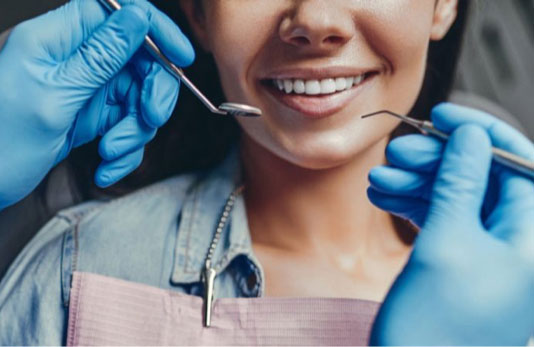When disaster strikes, protect your smile

You might not consider your oral health first and foremost when you’re preparing for a natural disaster. But dental challenges can arise at any time.
You can help keep everyone in your family safe and healthy if you know what to do during a disaster like a hurricane, earthquake, flood or other emergency that can make accessing dental care difficult.
Prepare a dental care kit
To help prepare for disasters, consider keeping an emergency kit on hand, one that includes items that could be useful if dental issues arise. Check that your disaster emergency kit includes:
- Gauze and cotton balls to stop bleeding and protect injured areas of the mouth
- A flashlight to see inside the mouth
- Mild soap and plenty of bottled water for rinsing and cleaning injuries
- Salt to make mouthwash, or saline solution, for rinsing the mouth
- A pair of rubber gloves for inspecting injuries
- Acetaminophen or ibuprofen to relieve pain
- Instant cold ice packs to treat swelling
- Up-to-date supplies of any prescribed oral medications you may need
- Your dentist’s phone number
Dental issues you shouldn’t worry about during a disaster
- Routine exams and cleanings. If you aren’t experiencing pain or discomfort, delaying a routine dental exam or cleaning because of a natural disaster won't be a problem. Remember to reschedule your appointment when your dentist becomes available.
- Regular orthodontic care. Don’t worry if a disaster prevents you from an orthodontic appointment; There is no danger to your dental health or harmful side effects if you miss an adjustment. If your orthodontic appliances are damaged or irritating your oral tissues and you can’t reach your orthodontist, try contacting a regular dentist for help. Most dentists can treat minor orthodontic emergencies.
- Temporary crowns or bridges. To keep your temporary crown or bridge safely in place, avoid eating and biting on it, try to keep it clean and don't chew hard or sticky foods until you can be seen by a dentist. Temporary crowns and bridges should be checked and possibly recemented within a month after placement.
Water and your oral health after a disaster
One of the primary threats to your oral and overall health after any natural disaster is contaminated water. Do not brush your teeth, wash your hands, prepare food or wash dishes with contaminated water. To learn more about making water safe during an emergency, refer to this flyer from the Centers for Disease Control and Prevention.
What to do if there’s a dental emergency
When faced with a dental emergency during a disaster, keeping calm and finding prompt professional care are among the most important things you can do.
Try to visit a dentist as soon as possible if you experience any of the following:
- Tooth injury
- Oral pain
- Swelling
- Bleeding
If the pain, swelling or bleeding are severe, seek immediate medical attention.
What to do until you can access care
During a natural disaster, accessing care may take longer than usual. Here’s how to handle some common dental issues while you’re seeking help:
Injured teeth
- Loose tooth. Apply very light pressure with the tip of your finger to correctly reposition the tooth. Do not force the tooth into its socket. Stabilize the tooth with a moist tissue or gauze. Contact your dentist as soon as possible.
- Chipped or fractured tooth. Try to find the missing piece. Place it in a moist cloth or baggie with a few drops of water or saliva as it may be possible to reattach it. Rinse your mouth with warm water and keep it clean until you can reach the dentist.
- Knocked-out tooth. Recover the lost tooth and gently rinse with water. Place the tooth between your cheek and gums or wrap it in a clean cloth or gauze soaked in milk or saline (salt water) solution. Keeping the tooth moist can increase the chance of re-implantation. See your dentist as soon as possible.
Other issues
- Bleeding. To stop blood flow, apply firm pressure to the injured area with gauze, cotton ball or clean cloth until you can reach the dentist or physician.
- Pain or swelling. If there is pain or swelling but no bleeding, soak a piece of gauze or a clean cloth in warm water and gently clean the affected area. Apply an ice compress. Contact your dentist or physician as soon as possible.
What if you still can’t find care?
If a natural disaster prevents you from finding medical attention, consider alternate ways of accessing care, including virtual dentistry tools. You can also call Delta Dental Customer Service or contact us through our online customer service form on the Delta Dental website for assistance.
Depending on the severity of the disaster, local, state or federal governments may respond by offering emergency oral health care and other medical services. To find out if oral health care services are available in your area, call your local health department or listen for public safety announcements on local TV and radio stations.
Whatever you do, don’t just ignore dental pain and hope it will go away. If you ignore the pain and swelling of an infection, it can continue to spread through your bloodstream. Dental infections are dangerous because of their proximity to your face and brain.
Claims and payment during a disaster
Whenever local, state or federal government declares a disaster, Delta Dental helps work to ensure you will not owe unreasonable fees if you have to visit an out-of-network dentist. If you’ve encountered a special situation or other extenuating circumstances resulting from a natural disaster, contact the Delta Dental customer service center for assistance.
Last updated December 27, 2022
Related articles:
The oral health information on this website is intended for educational purposes only. Always consult a licensed dentist or other qualified health care professional for any questions concerning your oral health.


